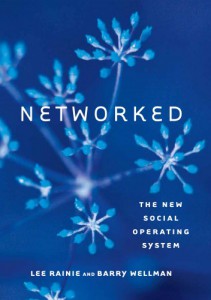
Lee Raine and Barry Wellman
![]() Networked, June 6, 2012
Networked, June 6, 2012
Jenny Davis
Broad Summary
Rainie and Wellman, using scores of data, argue that we live in a networked operating system characterized by networked individualism. They describe the triple revolution (networked revolution, internet revolution, and mobile revolution) that got us here, and discuss the repercussions of this triple revolution within various arenas of social life (e.g. the family, relationships, work, information spread). They conclude with an empirically informed guess at the future of the new social operating system of networked individualism, indulging augmented fantasies and dystopic potentials. Importantly, much of the book is set up as a larger argument against technologically deterministic claims about the deleterious effects of new information communication technologies (ICTs).
Networked Individualism and the Triple Revolution
Many scholars and commentators fear that a move away from social relational structures characterized by tightly knit groups and dense connections—largely caused by quickly advancing digital and electronic technologies— indicates a move towards an individualist, isolationist, technocratic social system. Such fears have been (in)famously proclaimed by Robert Putnam in Bowling Alone (2000), by Miller McPherson et al. in a 2006 ASR article, and most recently by Sherry Turkle in her new book Alone Together (2011) as well as in her recent NY Times editorial (discussed here by David Banks and here by Nathan Jurgenson).
Continue reading “Review (Guest): Networked – The New Social Operating System”

